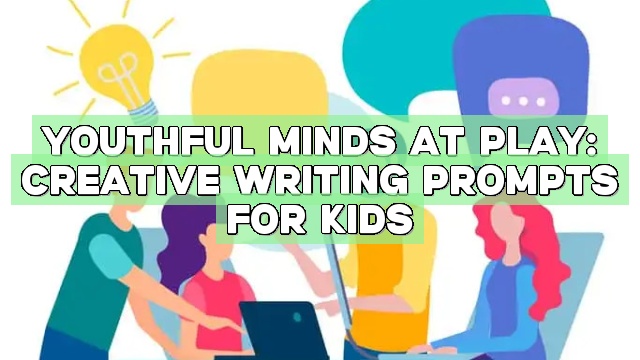Writing is not just a skill; it is an art form that can ignite a child’s imagination and bring their inner world to life through words. Creativity is an essential aspect of childhood development, and writing is an excellent tool to foster it. However, not every child is a natural storyteller, and that’s where creative writing prompts come in to inspire and nurture their creativity.
Key Takeaways
- Creative writing is an essential aspect of childhood development.
- Writing prompts can inspire and nurture children’s creativity and imagination.
- Not every child is a natural storyteller, but writing prompts can help.
Why Creative Writing Prompts for Kids?
As parents and educators, fostering creativity and enhancing writing skills in children is a top priority. Creative writing prompts are an excellent way to motivate expression and stimulate imaginative thinking in young minds. By providing a starting point for their writing, prompts can help with generating ideas, overcoming writer’s block, and broadening their perspective.
Using creative writing prompts can also help children develop their writing abilities and gain confidence in their skills. Whether it’s through free writing or structured exercises, prompts can help children experiment with different writing styles, genres, and formats. They can also inspire them to explore a wide range of topics and themes, from fantasy and sci-fi to personal experiences and everyday life.
By challenging children to think creatively and develop their writing skills, prompts can also encourage them to express themselves more fully and articulate their thoughts and feelings in a more effective manner. This can lead to improved communication skills, enhanced emotional intelligence, and a greater sense of self-awareness.
Getting Started: How to Use ChatGPT for Kids’ Writing Prompts
ChatGPT is an interactive platform designed to generate creative writing prompts for kids. It’s simple to use and can provide hours of inspiration and entertainment for young writers.
To access ChatGPT, simply visit their website and follow the prompts to access the chatbot. Once there, you can begin interacting with the system by typing out your desired prompt or subject matter. ChatGPT will then use its algorithms to generate various writing prompts related to your chosen topic.
| Step | Instructions |
|---|---|
| Step 1 | Go to the ChatGPT website |
| Step 2 | Access the chatbot |
| Step 3 | Type in desired prompt or subject matter |
| Step 4 | Interact with the system to generate various writing prompts |
It’s essential to remember that ChatGPT is an AI system, and the prompts generated may not always be perfect. It’s essential to evaluate each prompt to ensure that it’s age-appropriate and that the content matches your goals for your children’s learning objectives. It’s also essential to remember that while writing prompts can be helpful in stimulating creative thinking, they should not be used exclusively as a substitute for personalized guidance and instruction.
The system is free to use, and you can access it from any device with an internet connection. It’s an excellent tool for parents, educators, and young writers who are looking to foster creativity and enhance writing skills.
Fun and Engaging Creative Writing Prompts for Kids
Using creative writing prompts is an excellent way to encourage children to write and express their imaginative thoughts. ChatGPT offers a variety of prompts that can appeal to different interests and inspire kids to let their creativity run free. Below are some exciting themes that children can use as a guide for creating their stories.
Fantasy
| ChatGPT Prompt Question | Response Generated by ChatGPT |
|---|---|
| What if everyone in the world had a magical power? | “My power is to talk to animals,” said Lilly. She had always wanted to communicate with her pet dog and now she could! But she didn’t know that with great power comes great responsibility. Soon, she was caught up in a mysterious adventure that would change her life forever. |
| Write a story about a magic land hidden in the clouds. | Tommy had always felt out of place in the real world. But when he stumbled upon a hidden staircase that led him to a world of clouds, he knew he had found his true home. The Cloud Kingdom was full of wondrous creatures and marvelous adventures, and Tommy was determined to explore it all. |
Animals
| ChatGPT Prompt Question | Response Generated by ChatGPT |
|---|---|
| What if your pet dog could talk? | Samantha was shocked when she heard her dog, Max, speak for the first time. She had always suspected that he was smart, but she never imagined that he could converse like a human. As they chatted about their favorite things, Samantha realized that she had found a lifelong friend in Max. |
| Write a story about a group of animals going on a road trip. | The animals had been planning the ultimate road trip for weeks. They had a map, a list of snacks, and a van ready to go. As they drove through scenic routes and quirky towns, they encountered unexpected challenges and made unforgettable memories. |
Nature
| ChatGPT Prompt Question | Response Generated by ChatGPT |
|---|---|
| Write a story about a flower that could grant wishes. | Amy couldn’t believe her luck when she stumbled upon a magical flower that granted wishes. She wished for a never-ending supply of candy and was delighted when it appeared in her hand. But as she continued to make wishes, Amy realized that the flower had a dark secret. |
| What if trees could talk? | When Maya heard the trees whispering, she knew that something was wrong. They were afraid of a new company that was planning to cut them down and replace them with buildings. Determined to save her beloved woods, Maya made a plan with her friends to stop the destruction. |
Everyday Life
| ChatGPT Prompt Question | Response Generated by ChatGPT |
|---|---|
| What if humans hibernated like bears? | Emily had always looked forward to hibernation season. She loved the idea of sleeping for months and not having to worry about anything. But when she woke up from her first hibernation, she realized that the world had changed in ways she never expected. |
| Write a story about a day in the life of a superhero. | As soon as Alex put on his superhero suit, he knew that he was ready for anything. He flew through the city, stopping robberies and saving kittens from trees. But as the day wore on, Alex realized that being a hero wasn’t just about physical strength. It was also about having a big heart. |
With these creative writing prompts, children can explore different themes and come up with unique stories that showcase their imagination and writing skills. Using ChatGPT’s AI-generated prompts, kids can access endless possibilities and unleash their creativity with ease.
Benefits of Longer Prompts for Complex Tasks
While shorter prompts can be effective in sparking ideas and encouraging writing practice, longer prompts can be more beneficial when tackling more complex writing tasks.
Providing additional background information within the prompt can help children further develop their writing skills and analytical thinking. When given a longer prompt, children are forced to consider multiple perspectives and develop a deeper understanding of the task at hand.
For example, a prompt such as “Write a story about a day in the life of a bee” can be expanded to include additional details about the bee’s environment, purpose, and interactions with other insects. This added complexity encourages children to think critically about the world around them and develop their storytelling abilities.
Longer prompts can also provide more opportunity for children to express their creativity and imagination. When given more information to work with, children can explore different ideas and perspectives, and develop more complex characters and storylines.
In conclusion, while shorter prompts can be useful for developing writing skills and encouraging practice, longer prompts can provide additional benefits in terms of complexity, critical thinking, and creativity.
Nurturing Creativity: Tips for Parents and Teachers
Encouraging creativity in children can be a fun and rewarding experience for parents and teachers alike. Here are some practical tips and strategies to help foster imagination and inspire young writers:
Create a Supportive Writing Environment
Provide a dedicated space for writing, with plenty of supplies and materials. Encourage children to personalize their space with decorations or artwork. Make sure the environment feels safe and comfortable, so children feel free to experiment and take risks with their writing.
Set Achievable Goals
Set specific, attainable goals for writing projects. Encourage children to aim for small victories, such as completing a certain number of pages or reaching a specific word count. Celebrate their accomplishments with positive reinforcement, such as praise and small rewards.
Provide Constructive Feedback
Offer constructive feedback that focuses on specific strengths and areas for improvement. Encourage children to revise and edit their work, and provide guidance on how to do so effectively. Avoid overly critical or negative feedback, as this can discourage or demotivate young writers.
Encourage Exploration and Play
Allow children to explore different genres, topics, and styles of writing. Encourage them to experiment with form and structure, and to have fun with their writing. Provide prompts that challenge them to think outside the box and explore their imagination.
Model Writing Behavior
Show children that writing is a valuable and enjoyable activity by modeling writing behavior yourself. Share your own writing experiences and challenges, and demonstrate how to brainstorm ideas, organize thoughts, and revise drafts. Encourage children to write alongside you, and provide opportunities for them to share and showcase their work.
Cultivate a Love for Reading
Reading and writing are closely linked, so it’s important to foster a love for reading in children. Provide access to a variety of books and materials, and encourage children to read for pleasure and exploration. Discuss books and stories together, and use them as inspiration for writing prompts and projects.
By nurturing creativity in young writers, parents and teachers can help unlock the full potential of their imagination and writing skills.
Inspiring Young Writers: Success Stories
There are countless inspiring success stories of children who have utilized creative writing prompts to grow as writers. These prompts have helped students of all ages to discover their unique voice and unleash their imagination.
| Case Study 1: | John’s Journey |
|---|---|
| |
John’s story is just one example of the transformative power of creative writing prompts. Another success story involves 10-year-old Samantha, who had struggled with spelling and grammar. After using creative writing prompts, Samantha was able to enhance her writing skills and gain the confidence to share her work with others.
| Case Study 2: | Samantha’s Success |
|---|---|
| |
These stories of success prove that with the help of creative writing prompts, children can unlock their full potential as writers and build a lifelong love for writing.
Continuing the Journey: Resources for Kids’ Creative Writing
Providing children with creative writing prompts is just the beginning of their journey as young writers. As they continue to explore their imagination and hone their skills, there are several resources available to help them along the way.
Books
Books are an excellent tool for young writers to develop their craft. Here are some titles that offer writing prompts, tips, and exercises:
| Title | Author | Description |
|---|---|---|
| Unjournaling: Daily Writing Exercises That Are Not Personal, Not Introspective, Not Boring! | Dawn DiPrince and Cheryl Miller Thurston | A collection of quirky and unconventional writing exercises that invite children to think outside the box. |
| Rip the Page!: Adventures in Creative Writing | Karen Benke | A guidebook with 200 prompts aimed at children aged 8-12 that celebrate the freedom and joy of writing. |
| Spilling Ink: A Young Writer’s Handbook | Anne Mazer and Ellen Potter | A comprehensive guide that covers all aspects of writing, including generating ideas, crafting characters, and revising. Suitable for children aged 8-12. |
Websites
Online resources offer a wealth of information and inspiration for young writers. Here are some websites that offer writing prompts and tips:
- To Fluency: A list of 50 creative writing prompts geared towards children aged 8-14.
- Scholastic: A free printable worksheet that contains three writing prompts and space for children to write their responses.
- Education.com: A collection of writing prompts and activities that are categorized by age and skill level.
Workshops
Attending a writing workshop can provide children with an opportunity to learn from experienced writers and connect with other young writers. Here are some organizations that offer creative writing workshops for children:
- Writopia Lab: A national writing program that offers workshops, camps, and online classes for children aged 8-18.
- Young Writers Society: An online community that provides writing resources, forums, and workshops for young writers aged 13-25.
- Superstition Review: A literary magazine that hosts an annual writing workshop for high school students.
By utilizing these resources, parents and teachers can help children channel their creativity and develop their writing skills. With practice and guidance, young writers can unlock their imagination and achieve their full potential.
Unlocking Imagination: Conclusion
Using creative writing prompts is an excellent way to help children enhance their writing skills and nurture their imagination. By encouraging them to think creatively and express themselves through writing, we can help them develop essential life skills that they can carry with them into adulthood.
Through the use of ChatGPT and the provided prompts, children can explore a variety of themes and ideas, sparking their creativity and broadening their perspective. Longer prompts can also be a great tool for tackling more complex tasks, providing additional background information to help children further develop their writing skills and analytical thinking abilities.
As parents or educators, we can support children’s creativity by creating a supportive writing environment, setting achievable goals, and providing constructive feedback. Inspiring success stories have already shown the positive impact that creative writing prompts can have on children’s confidence, creativity, and overall development.
Resources for Kids’ Creative Writing
For those interested in further exploring creative writing opportunities, there are many resources available. Books such as “A Year of Creative Writing Prompts,” workshops, and online writing communities can all provide additional support for young writers.
Unlocking imagination is a journey that lasts a lifetime. By embracing creativity in young minds, we can help unlock their potential and encourage them to explore the world around them. Try out the creative writing prompts provided, and encourage your child to continue exploring their imagination through writing.
FAQ
Q: What are creative writing prompts?
A: Creative writing prompts are prompts or ideas that serve as a starting point for children’s writing. They are designed to inspire creativity, enhance writing skills, and motivate self-expression.
Q: How can creative writing prompts benefit kids?
A: Creative writing prompts can foster creativity by stimulating imaginative thinking and encouraging children to think outside the box. They also enhance writing skills by providing opportunities for practice and exploration. Additionally, they motivate expression and help children develop their unique voice.
Q: How do I use ChatGPT for kids’ writing prompts?
A: To use ChatGPT for kids’ writing prompts, access the platform and engage in a conversation with the AI. Simply ask for writing prompts and ChatGPT will generate them for you. You can then use these prompts as inspiration for your child’s writing.
Q: What are some fun and engaging creative writing prompts for kids?
A: There are numerous creative writing prompts for kids that cover various themes such as fantasy, animals, nature, and everyday life. Some examples include “Write a story about a magical creature you discover in your backyard” and “Describe your favorite animal and why you love it.”
Q: Why are longer prompts beneficial for complex tasks?
A: Longer prompts provide additional context and information, which can help children tackle more complex writing tasks. By having more details to work with, children are able to develop their writing skills and analytical thinking further.
Q: How can parents and teachers nurture creativity in children?
A: Parents and teachers can nurture creativity by creating a supportive writing environment, setting achievable goals, providing constructive feedback, and encouraging exploration and experimentation.
Q: Can you share any inspiring success stories of children using creative writing prompts?
A: Yes, there are numerous success stories of children who have utilized creative writing prompts to grow as writers. These prompts have helped boost their confidence, spark their imagination, and improve their overall writing skills.
Q: Are there any additional resources for kids’ creative writing?
A: Yes, there are plenty of additional resources available, including books, websites, and workshops, that can further support children’s creative writing journey. These resources offer guidance, exercises, and inspiration for young writers.
Q: What is the significance of creative writing prompts in unlocking imagination?
A: Creative writing prompts play a crucial role in unlocking children’s imagination by providing them with a starting point and encouraging them to think creatively. They help children explore new ideas, expand their horizons, and unleash their creative potential.









